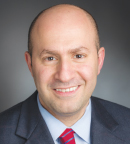Adjuvant pembrolizumab following surgery significantly improved disease-free survival compared with placebo among patients with high-risk clear cell renal cell carcinoma (RCC), according to the international phase III KEYNOTE-564 study presented at the Plenary session during the 2021 ASCO Annual Meeting.1 The addition of the immune checkpoint inhibitor as adjuvant therapy led to a 32% reduction in the risk of disease recurrence or death compared with placebo.

“KEYNOTE-564 is the first phase III study to show an improvement in disease-free survival with adjuvant immunotherapy in patients with high-risk, fully resected clear cell RCC.”— Toni K. Choueiri, MD
Tweet this quote
“KEYNOTE-564 is the first phase III study to show an improvement in disease-free survival with adjuvant immunotherapy in patients with high-risk, fully resected clear cell RCC, the most common type of kidney cancer. The improvement in disease-free survival was statistically significant and clinically meaningful. KEYNOTE-564’s disease-free survival supports pembrolizumab as a potential new standard of care in renal cell carcinoma,” said lead author Toni K. Choueiri, MD, of Dana-Farber Cancer Hospital, Boston.
Background
Renal cell carcinoma is common in both men and women, responsible for 175,000 deaths worldwide in 2018. At diagnosis, most patients present with localized disease, but up to 40% will develop metastatic disease after surgery.
Partial or radical nephrectomy to remove the tumor is commonly used to treat RCC. Patients with intermediate- to high-risk advanced disease are at risk for relapse, and there are no standard treatment options after surgery to prevent relapse.

Julie R. Gralow, MD, FACP, FASCO
“Despite surgery, recurrence is common in clear cell RCC, and should it recur, there are limited curative treatments for patients. Given the success of pembrolizumab in the KEYNOTE-564 trial, this population may soon have a new standard of care,” said ASCO Chief Medical Officer and Executive Vice President Julie R. Gralow, MD, FACP, FASCO, at a premeeting press conference where these findings were previewed.
Study Details
The randomized, double-blind, multicenter KEYNOTE-564 trial enrolled 994 patients with histologically confirmed high-risk clear cell RCC who had undergone nephrectomy at least 12 weeks prior to randomization. Patients had no prior systemic therapy. They were randomly assigned 1:1 to receive adjuvant pembrolizumab at 200 mg every 3 weeks for up to 17 cycles (about 1 year) or placebo. The primary endpoint was disease-free survival per investigator’s assessment; overall survival and safety were secondary endpoints.
Key Findings
At a median follow-up of 24 months, the primary endpoint was met. Median disease-free survival was not reached in either treatment arm. Pembrolizumab reduced the risk of recurrence or death by 32% compared with placebo, and this difference was statistically significant (P = .0010). The 12-month disease-free survival was 85.7% with pembrolizumab vs 76.2% with placebo. At month 24, the rate of disease-free survival was 77.3% vs 68.1%, respectively.
“There was about a 10% absolute difference [in disease-free survival] between both arms at 12 months and 24 months,” Dr. Choueiri told listeners.
KEY POINTS
- KEYNOTE-564 is the first phase III study of adjuvant immunotherapy in renal cell carcinoma and the first of many adjuvant approaches to be positive in a phase III trial.
- Adjuvant pembrolizumab prolonged disease-free survival, showing a 32% reduction in the risk of recurrence or death versus placebo; it also appears to have an early survival benefit.
- Reported toxicities were in line with expectations.
- Experts consider these study findings potentially practice-changing.
Survival data are premature, but at month 24, 96.6% of the pembrolizumab group were alive vs 93.5% of the placebo group, representing a 46% reduction with pembrolizumab. There were 18 deaths in the pembrolizumab group vs 33 in the placebo group. Additional follow-up is planned.
Toxicity
“Safety results were in line with expectations, and there were no new safety signals with pembrolizumab,” Dr. Choueiri said.
All-cause adverse events were reported in 96.3% of the pembrolizumab group vs 91.1% of the placebo group. Grade 3 to 5 adverse events occurred in 32.4% vs 17.7%, respectively. There were two deaths in the pembrolizumab arm and one in the placebo arm due to all-cause adverse events.
MORE INFORMATION
For more about the use of pembrolizumab as postnephrectomy adjuvant therapy for renal cell carcinoma in the KEYNOTE-564 trial, see an interview with Toni K. Choueiri, MD, on The ASCO Post Newsreels as ascopost.com/videos
Treatment-related adverse events were reported in 79.1% of the pembrolizumab arm vs 53.4% of the placebo arm. Grade 3 to 5 treatment-related adverse events occurred in 18.9% vs 1.2%, respectively. No deaths due to treatment-related adverse events were reported.
DISCLOSURE: KEYNOTE-564 was sponsored by Merck Sharpe & Dohme. Dr. Choueiri reports a financial and/or nonfinancial relationship (including potential reimbursements for travel and meals) with Alexion Pharmaceuticals, Alligent, Analysis Group, ASCO, AstraZeneca, Bayer, Bristol Myers Squibb, Cerulean Pharma, Clinical Care Options, Corvus Pharmaceuticals, Eisai, EMD Serono, Exelixis, Foundation Medicine, Genentech/Roche, GlaxoSmithKline, Harborside Press, Heron, Ipsen, Kidney Cancer Journal, The Lancet Oncology, Lilly, Lpath, Merck, Jansen, Michael J. Hennessy Associates, Navinata Healthcare, NCCN, The New England Journal of Medicine, Novartis, Peloton Therapeutics, Pfizer, PlatformQ Health, Prometheus, Sanofi/Aventis, and UpToDate. He has received institutional research funding from Agensys, Analysis Group, AstraZeneca, Bayer, Bristol Myers Squibb, Calithera Biosciences, Celldex, Cerulean Pharma, Congressionally Directed Medical Research Programs, Corvus Pharmaceuticals, Eisai, Exelixis, Foundation Medicine, Gateway for Cancer Research, GlaxoSmithKline, Ipsen, Merck, National Cancer Institute, Novartis, Peloton Therapeutics, Pfizer, Prometheus, Roche/Genentech, Seattle Genetics/Astellas, Takeda, and Tracon Pharma; holds international patents for biomarkers and has other relationships with ClinicalThinking, Envision Pharma Group, Fishawack Group of Companies, Health Interactions, and Parexel (medical writing assistance). He holds stock or other ownership interests in Pionyr Immunotherapeutics and Tempest Therapeutics. Dr. Berthold reported no conflicts of interest. Dr. Gralow has served as a consultant or advisor to AstraZeneca, Genentech, Genomic Health, Immunomedics, Merck, Novartis, Pfizer, Puma Biotechnology, and Sandoz.
REFERENCE
1. Choueiri TK, Tomczak P, Park SH, et al: Pembrolizumab versus placebo as post-nephrectomy adjuvant therapy for patients with renal cell carcinoma: Randomized, double-blind, phase III KEYNOTE-564 study. 2021 ASCO Annual Meeting. Abstract LBA5. Presented June 6, 2021.


